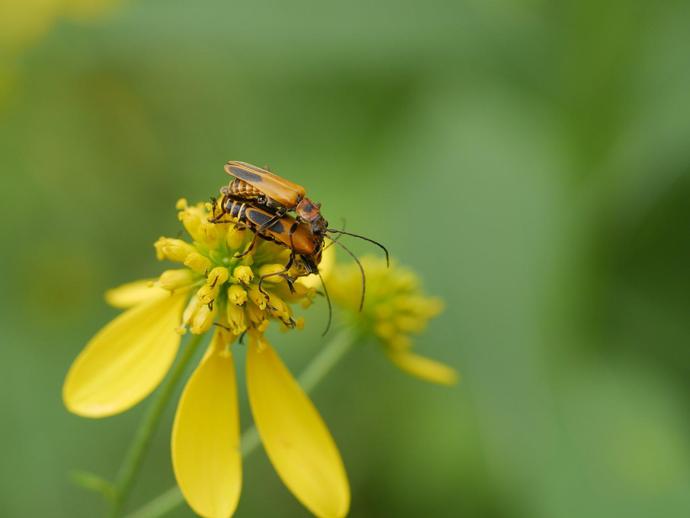September 22, 2020
This is the goldenrod soldier beetle (Chauliognathus pensylvanicus), and I can't help but feel like a bit of a creep sharing these photos of intimate moments between these insects. However, in my experience, it's harder to find these beetles NOT mating than it is to find them mating. Feel free to write your own joke here!
These beetles can be found throughout a large portion of North America, and they're particularly common in the Midwest. They're mainly active in August and September, and if you have a lot of goldenrod on your property, they're very easy to spot because they emerge in huge numbers. While they're most closely associated with goldenrod, they can be found on a wide variety of flowers, including Queen Anne's Lace and milkweed. They feed on the pollen and nectar from these flowers, but they will also eat small insects from time to time.
The female beetles lay their eggs in the soil, and the beetle larvae feed on grasshopper eggs and other insect larvae. They pupate in the spring and emerge in the late summer.
One thing you might have noticed while reading this post is that the goldenrod soldier beetle's scientific name is misspelled! According to BugGuide.net (a wonderful website I highly recommend!) this is because when Charles DeGeer identified this beetle in 1774, Pennsylvania was commonly spelled "Pensylvania." According to the International Code of Zoological Nomenclature, which regulates the formal scientific naming of animals, a scientific name can only be corrected if it contains a typographical error. Since DeGeer's single-N spelling of Pennsylvania was correct during his time, it is not considered a typo and cannot be changed! #BenInNature
ABOUT #BENINNATURE
Social distancing can be difficult, but it presents a great opportunity to become reacquainted with nature. In this series of posts, Administrator of Science Ben Williams ventures outdoors to record a snapshot of the unique sights that can be found in the natural world. New updates are posted Monday - Friday, with previous posts highlighted on the weekends.
NATURE PHOTO IDENTIFICATIONS
If you discover something in nature that you would like help identifying, be sure to message us right here on Facebook with a picture (please include location and date of picture) and we'll have our experts help you identify it!

 Hours & Admissions
Hours & Admissions Directions
Directions

